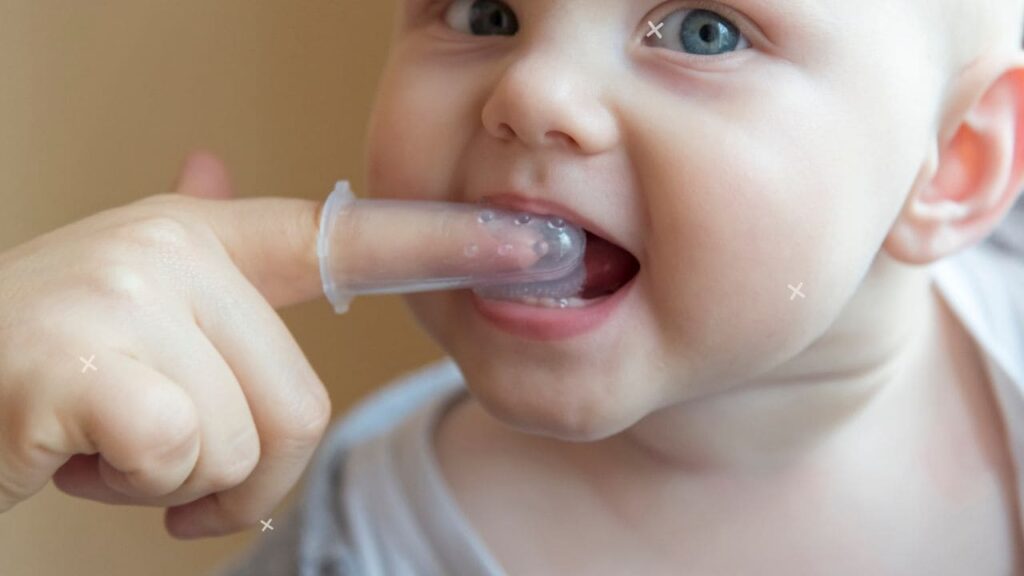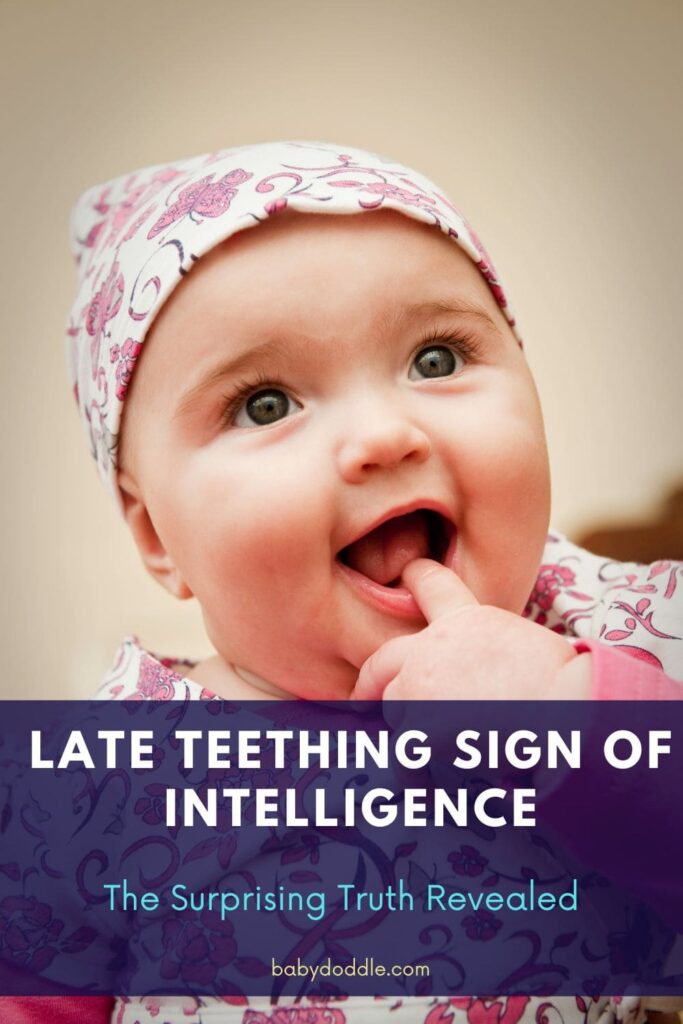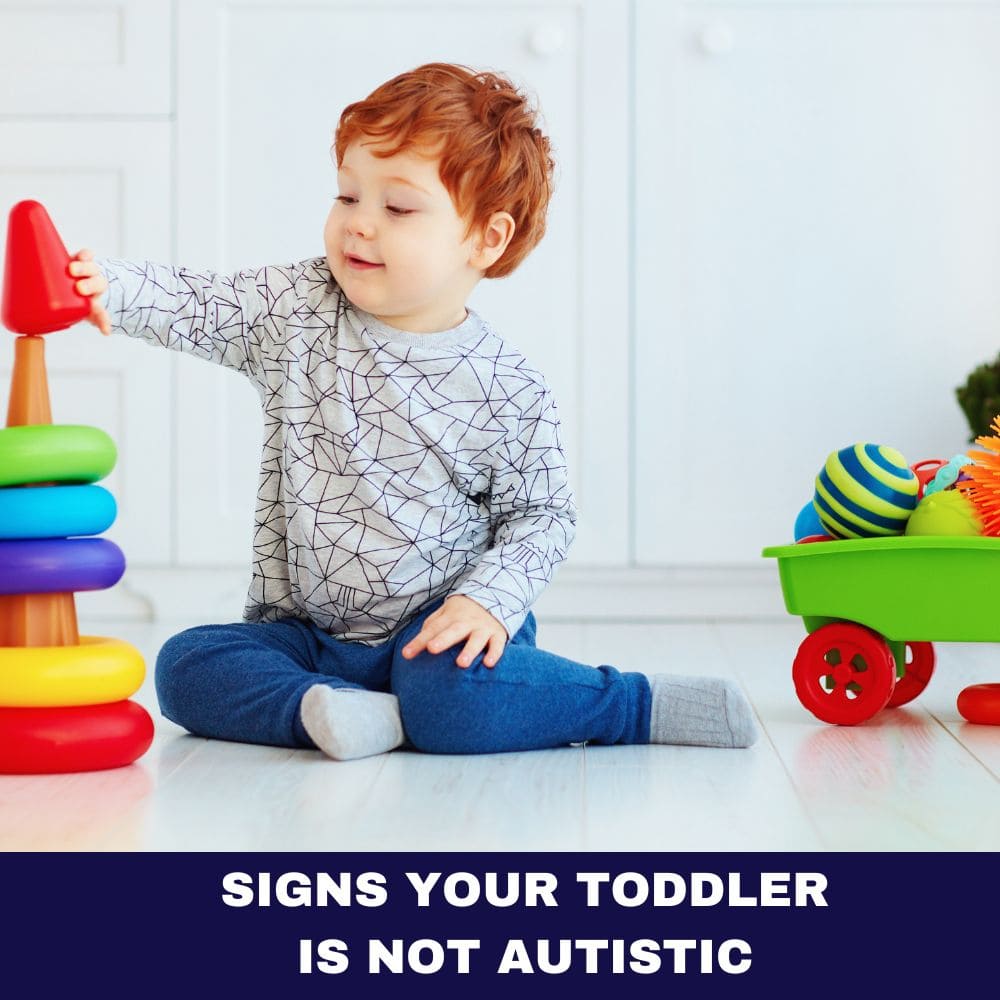As a parent, you likely watch your baby’s development eagerly, celebrating each new milestone with joy. That first smile, rolling over, and sitting up each represents exciting progress as your little one gains new abilities. And when those first tiny teeth pop through swollen gums—success! Your baby can now start sampling solid foods beyond milk.
But what if those pearly whites don’t show up on schedule? What if you notice a late teething sign and begin to wonder if there is a link to intelligence? As you anxiously await evidence that teething is coming soon, you may take comfort in oft-repeated wisdom: late teething is a sign of intelligence. After all, genius inventor Albert Einstein reportedly didn’t cut his first tooth until he was over a year old!
However, is there any truth to this connection between late teething and giftedness? Can delayed dental eruption really predict advanced cognitive abilities? Let’s explore the facts and myths around this common belief.

When Do Babies Normally Start Teething?
Before determining what counts as “late”, we first need to establish what’s normal. Most babies sprout their first tiny tooth buds around 6 months of age. Typically, two bottom front teeth push through first, followed by two uppers. Some infants can experience teething symptoms months before any appear. Others may teethe with no discomfort at all.
By a child’s first birthday, they usually have a minimum of four teeth. Eight baby teeth often emerge by 18 months and a full set of 20 deciduous (baby) chompers by age 3. Toddler teeth tend to come in pairs with a few months between. While molars take longer, erupting between 12-33 months.
Every baby develops differently. But if no teeth appear several months beyond the average range, that’s considered delayed teething. Late teething means after 15 months for the first tooth or after age 3 without a full set. Many parents of late teethers wonder what’s causing the lag.
| Milestone | Age Range |
|---|---|
| First Tooth | 6-12 months |
| 4 teeth | 12-18 months |
| Full set of 20 baby teeth | 18-33 months |
What Causes Late Teething?
A variety of factors influence why some babies teethe later than usual:
Genetics Late onset runs in families. If parents were late teethers, their children often followed suit. Inherited dental quirks like extra or fused teeth may also delay typical eruption patterns.
Low Birth Weight
Premature or underweight infants frequently experience slowed development, including delayed teething by months.
Nutrition
Deficiencies in key teeth-building nutrients like calcium, phosphates, vitamin C or D may potentially hamper dental development.
Medical Conditions
Certain illnesses or congenital disorders can affect tooth growth like cleft palate, Down Syndrome, congenital hypothyroidism or vitamin D deficiency rickets.
Anomalies
Structural irregularities in the gums or bone density, in rare cases, may cause eruption issues.
Genetics and low birth weight are by far the most common explanations for late bloomers. Underlying disorders are relatively rare. So if your baby passes that first birthday or 18 months without any pearly whites, take heart! There’s likely no cause for concern.
| Symptom | Description |
|---|---|
| Swollen gums | Gums may appear inflamed or tender before teeth erupt through |
| Increased drooling | Excess dribbling that soaks bibs/clothes |
| Gumming or chewing | Baby may gnaw fists, toys or other objects to relieve discomfort |
| Trouble sleeping | Discomfort may make sleep difficult |
| Decreased appetite | Chewing pain may hamper feeding |
| Rash around mouth | Heat rash from moisture is common |
Are Late Teethers Gifted? Unlocking Myth From Fact
The notion linking late teething and intelligence stems from observations of brilliant late bloomers like Albert Einstein and Mark Zuckerberg possibly starting to teethe after 12 months. Creative genius requires marching to your own developmental drummer, or so the legend goes. But what does science actually say?
Fact: No proven correlation exists between the timing of a child’s first tooth and their IQ. Baby teeth simply reflect growth and maturation level. Early walkers aren’t necessarily early talkers or quick learners. Physical development and intellectual capability don’t go hand in hand.
Myth: Exceptionally smart historical figures teethed late. The basis for such claims remains questionable given lack of dental records. Speculation relies on unreliable childhood recollections or family lore.
Fact: Late teething indicates no physical or cognitive deficiencies. As long as baby is healthy overall with age-appropriate mental and motor skills, parents needn’t worry. There are no cognitive disadvantages to slower dental development.
Myth: Late maturation forecasts a growth spurt. No evidence suggests those lagging in baby teeth erupt permanent teeth or hit puberty especially late or early either. Physical maturation varies child to child.
In truth, the timetable question remains open. A 2014 study suggested a modest IQ advantage for early teethers. However, data stays inconsistent. For now, science cannot definitively answer whether the timing of the first tooth predicts intelligence or talent.

Supporting Your Late Teether
If your baby reaches that first birthday with no pearly whites in sight, refrain from worries about their brainpower! Focus instead on making them comfortable and supporting healthy development with these tips:
Mind the gums
Rub swollen gums very gently with a clean finger or wet washcloth. The pressure soothes without overstimulating.
Chill out
Soothe sore gum spots by letting baby gnaw on chilled (not frozen) wet washcloths. The cool temperature dulls the pain.
Up the chewing
Offer safe gumming toys like silicone teethers or cold wet vegetables. Chewing motion strengthens emerging teeth and distracts from discomfort.
Stick to soft foods
As solids get introduced, choose gentle fares like smooth yogurt, mashed bananas or stewed apples. Avoid tough, hard-to-chew foods for toothless babies.
Supplement nutrition
Consult your pediatrician about supplementing with fluoride, iron or vitamins needed for dental growth lacking in breastmilk/formula.
See a pediatric dentist
Take your late teether for an evaluation around age 1 to ensure no oral issues are interfering with eruption.
Practice patience
Support healthy development through play, massage and learning activities while awaiting teething’s natural start. They’ll come in time!
While the arrival of first teeth brings huge excitement after months of waiting, try not to hyperfocus on physiological markers you can’t control. Each child unfolds in their own wonderful way. Late bloomers have just as much potential to dazzle us with their gifts!
Is Delayed Teething a Sign of Intelligence?
As we just discussed, no evidence reliably links the timing of first teeth to mental ability in one way or another. However, theories persist about precocity across developmental domains. Are early talkers early readers? Does walking sooner equate higher IQ? Here we’ll analyze key research related to baby milestones and cognition.
What Studies Show About Milestone Timing and Intelligence
Child development researchers certainly notice intriguing patterns. Early talkers do often grasp reading sooner. Quick crawlers may hit physical milestones faster. Social babies tend to have advanced emotional intelligence. But in terms of measurable IQ or specific skills, connections stay unreliable.
Stanford University researchers tracked 500 children from birth searching for links between milestone timing and intelligence. Very modest correlations emerged only between motor skills and academic achievement—and those faded by age 10. In other words, no lasting relationship stood between physical maturation rate and cognitive gifts.
Likewise, a Norwegian study of over 75,000 children found little impact of milestone age on school performance. Another study assessing attainment of 16 milestones from birth to 5 years found no clear sequence predicting intelligence. Babies simply develop asynchronously across domains in line with individual variation.
In fact, multiple analyses agree: that while advanced cognitive ability often surfaces early, many gifted children bloom more slowly or unevenly. Late bloomers prove high aptitude for specialized skills like music, math, spatial reasoning or languages equally often.
Therefore, while observing your baby’s early progress offers exciting clues to their talents, no single developmental path forecasts their future precisely. All babies brighten the world with their own genius in the fullness of time!

What Late Teething Might Actually Indicate
If late teething doesn’t necessarily signify a budding Einstein in the wings, are there any useful developmental insights to glean? A few possibilities exist.
Genetic patterns. Late-onset frequently runs in families—so check your teething history! If you or your spouse teethed after the average range, chances remain higher for passing along that genetic timing.
Normal variation. Every child follows their own clock. Without accompanying issues, late bloomers likely represent normal variance across humanity’s rich diversity.
Diet. Nutrient deficiency can potentially slow dental eruption. Discuss the baby’s iron and mineral intake with your pediatrician.
Underlying conditions. Though rare, certain disorders like congenital hypothyroidism or hypopituitarism may interfere with tooth production. Have your pediatrician check for complications if concerned.
Low birth weight. Preemies often experience delayed teething proportional to how early they arrive. The more months before 40 weeks, the later eruption may occur.
Bottom line—for the majority of babies without complicating disorders, late eruption remains no cause for concern. It simply reflects their unique growth story. However, do seek medical advice if you have worries or baby shows developmental issues in multiple areas.
Famous Late Bloomers: You’re in Good Company!
They say genius takes its own sweet time to emerge. And throughout history, many luminary figures showed the first signs of their greatness only after slow or awkward early years—including a delay in getting those baby teeth! Knowing you’re in good company with famous late bloomers brings encouragement as you await your baby’s first pearly whites.
Mark Zuckerberg didn’t say his first word until age 3 and was reportedly a late teether as well. The future tech mogul clearly took after his dentist father Edward’s propensity for late blooming. Today CEO of Meta is doing pretty well!
Ludwig van Beethoven renowned as a musical prodigy did not speak fluently until age 6. The virtuoso composer first learned numbers as his mother’s way of gauging the young piano student’s listening skills. Yet by age 7, little Ludwig began performing publicly—a shining star.
Thomas Edison is famous for persistence through multiple invention failures surprise, surprise—also teethed late! The quintessential genius tinkering away for long nights in his workshop first entered school at age 8 due to delays in speech and physical growth. Later teachers summed up bright promise despite the slow start.
Elvis Presley may have left the building decades ago but The King still rules the hearts of millions. Hard to imagine the hip-swiveling rock and roll pioneer had limited motor skills early on and didn’t talk until around age 4! Glamorous film star Marilyn Monroe also started speaking late before becoming Hollywood’s most legendary blonde.
Julia Child who revolutionized American cooking with her TV shows didn’t find her life’s calling until age 40! The beloved chef was considered an awkward, undistinguished child growing up tall and gangly in an athletic family. Late bloomers can surprise us all!
As you await your little late bloomer’s first tooth, take heart looking at history. Einstein didn’t speak fluently until after age 3. Oprah was born prematurely building up strength in early years. Even Mozart endured mischievous childhood scrapes before showcasing his prodigious talents to the world!
Brilliant seeds unfold on their own schedule. Your late teether may bloom into the next visionary inventor, virtuoso violinist or cultural icon inspiring generations. Their path ahead glimmers with amazing possibilities!
| Name | Accomplishment(s) |
|---|---|
| Albert Einstein | Father of modern physics |
| Thomas Edison | Prolific Inventor |
| Julia Child | Celebrity Chef |
| Mark Zuckerberg | CEO of Meta |
The Truth About Late Teething: Key Takeaways
While waiting and wondering over a baby’s first tooth stretches patience, a few simple truths relieve stress:
- No evidence proves late eruption hints at cognitive gifts or delays. Timing varies.
- Common factors causing delayed emergence include genetics, low birth weight or nutritional issues—not intelligence predictors.
- Many healthy late bloomers show no developmental problems. They simply represent normal variation.
- Physical and mental progress remain imperfectly linked, so try not to compare babies. All have special strengths.
- If medical conditions get ruled out, adopt a relaxed, supportive attitude for your late teether. Growth moves at each child’s pace.
The takeaway for frazzled moms and dads? Breathe easy if those pearly whites take longer to emerge. Help your baby thrive through this period by providing affection, nutrition and stimulating play. Avoid placing weighty expectations on physiological progress.
Whether early birds or late bloomers, all babies delight us with their blossoming personalities. Focus on nurturing your child’s health and emerging gifts at their unique rhythm. Their inner genius will unfold wondrously in time, sure as the sun rises!
FAQ – Late Teething Sign of Intelligence
Does late teething mean my child has a higher IQ or intelligence?
No clear evidence proves that the timing of a child’s first tooth positively correlates with intelligence or IQ. While some exceptionally intelligent figures like Einstein were reportedly late teethers, plenty of genius minds teethed early or on-time too. Every child follows their own developmental clock regardless of their cognitive skills.
What’s considered medically “late” teething?
Most doctors define late teething as: no teeth by 12-14 months or less than 4 teeth by age 18 months. Many healthy late bloomers show no issues. However, at 24 months with no teeth medical assessment may check for complications impeding dental eruption.
My baby is 1 with no teeth – should I worry?
While frustrating to anxiously await their first tooth beyond the average range, try not to worry excessively over your late teether. Unless accompanying developmental delays exist, late eruption often reflects normal variation, especially if it runs in your family genetics. Stay positive and promote good nutrition.
What nutrients support healthy teething?
Key minerals like calcium, phosphates, magnesium and vitamins C, D, K2 & A play vital roles in tooth formation and eruption. Discuss your breastfeeding or formula approach with your pediatrician to address any deficiencies through supplementation if need be.
How can I soothe teething discomfort for my baby?
Numb swollen gums by providing good refrigerated teething toys, cold wet washcloths, frozen banana or bagel to chew. Gentle gum massages and frozen fruit in mesh bags can bring relief too. Over-the-counter pain relievers are not usually recommended.
The key is observing your late teether’s overall development. If only teething lags but weight, motor skills and socialization seem on track – they’re likely just following their own clock. Consult your pediatrician if you have worries.
My baby was born premature, does that cause late teething?
Yes, premature babies are more likely to experience delayed teething compared to full-term infants. The earlier the premature birth, the greater the lag in hitting dental milestones. This reflects physiological development needing extra time to reach maturity levels for teeth to erupt. Don’t compare your preemie’s timeline to term babies.
Could genetics explain why my baby is a late teether?
Absolutely – genetics commonly cause delayed emergence, especially if parents were also late bloomers. Other inherited dental quirks like extra teeth or atypical oral anatomy also postpone typical eruption timelines. If multiple generations on either parental side teethed late, chances remain high for passing along that DNA blueprint.
The key is not to worry about the timing itself provided your baby meets other appropriate development markers for their corrected age. Focus on nutrition, soothing discomfort and waiting patiently on their timeline. Consult your dentist if you have any concerns.












